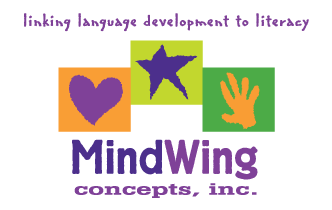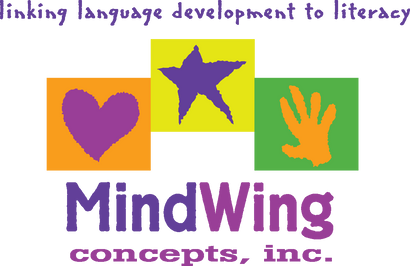Secure Checkout. FREE SHIPPING for Continental U.S. Orders over $60.
Menu
-
- Home
-
About Us
-
The Approach
-
Linking Language & Literacy
-
MindWing Learning
-
Learning Resources
-
SHOP
-
Blog
-
- About MindWing
- Our People
- Contact Us
- Your Account
- Login
-
United States (USD $)

Secure Checkout. FREE SHIPPING for Continental U.S. Orders over $60.

Tech Tuesday/Summer Study Series: Narrative Language and Social Emotional Programming
August 29, 2023
“Interjections” has always been my favorite Schoolhouse Rock song, and I am sure we have some we would like to utter about summer being (almost!) over. But it is always good to return to work with a sense of purpose, right? It has been fun writing this year’s Summer Study Series and I thought this last piece was particularly relevant to our roles in being part of a collaborative community in schools. Engaging minds and hearts: Social and emotional learning in English Language Arts (click for full free PDF article) is an honest, insightful look at SEL programming and has helpful suggestions for its integration in ELA classes. To me, though not explicitly stated here, it highlights the role of narrative language intervention and applications of Story Grammar Marker® and the Critical Thinking Triangle in helping our students unpack stories to learn from the higher level elements of feelings, plans and mental states. Though this article relates to such instruction in Canada, it is just as relevant to schools in the USA...

Tech Tuesday/Summer Study Series: Listening on Assessments
August 03, 2023
As many narratives could tell us (think of Shirley Jackson’s “The Lottery” as an extreme example), just because something “has always been done this way” does not mean it shouldn’t be questioned. This month we’ll turn that concept into thinking about standardized tests, too-long THE> determining factor in whether students do or do not receive speech and language interventions, particularly in the public school setting. Without inserting my POV too much into this topic, let’s keep the Summer Study Series focus and take a look at the recent review article published in Language, Speech and Hearing Services in Schools, A Critical Analysis of Standardized Testing in Speech and Language Therapy (Nair, Farah & Cushing, 2023). The authors recount the history of speech and language intervention as dating back to the Middle Ages, with recognition of speech disabilities and efforts to remediate seen in cultures such as ancient India...

Tech Tuesday/Summer Study Series—“Another Narrative-Related Meta-Analysis!”
May 28, 2023
 It’s great to have another resource due to the publication of this study, Investigating Narrative Performance in Children With Developmental Language Disorder: A Systematic Review and Meta-Analysis (Winters, Jasso, Pustejovsky & Byrd, 2022). “Thus the story grammar model appears to be a valid representation of how individuals organize story information in order to encode, understand and retrieve stories.” The Journal of Speech, Language and Hearing Research is more technical than some publications, but I’ve provided some salient points below. One way this study differs from the previously discussed meta-analysis is that it focuses on assessment rather than intervention. Among its aims are looking at different narrative measures such as macrostructure, microstructure, and internal state language, and identifying which may have a better sensitivity in identifying developmental language disorder (DLD)...
It’s great to have another resource due to the publication of this study, Investigating Narrative Performance in Children With Developmental Language Disorder: A Systematic Review and Meta-Analysis (Winters, Jasso, Pustejovsky & Byrd, 2022). “Thus the story grammar model appears to be a valid representation of how individuals organize story information in order to encode, understand and retrieve stories.” The Journal of Speech, Language and Hearing Research is more technical than some publications, but I’ve provided some salient points below. One way this study differs from the previously discussed meta-analysis is that it focuses on assessment rather than intervention. Among its aims are looking at different narrative measures such as macrostructure, microstructure, and internal state language, and identifying which may have a better sensitivity in identifying developmental language disorder (DLD)...

Tech Tuesday: Follow your Students’ Tunes!
April 24, 2023
 In this Autism Acceptance Month, it’s more important than ever to hear the voices coming out of the neurodiversity movement and those of our students themselves. With many autistic individuals growing up and sharing via social media and other channels what has and hasn’t worked in their education, we have some affirming shifts that we can make, for sure. One angle that I always try to take is incorporating my students’ interests in sessions. This helps our activities to be engaging and context-driven, but also incorporates client values, a pillar of evidence-based practice. A teenage client of mine has shown a burgeoning interest in rock music and The Beatles in particular. It occurred to me immediately that many Beatles’ songs tell a story, so that was a great place to start. One of the key things I love about technology is that it can make context immediately available...
In this Autism Acceptance Month, it’s more important than ever to hear the voices coming out of the neurodiversity movement and those of our students themselves. With many autistic individuals growing up and sharing via social media and other channels what has and hasn’t worked in their education, we have some affirming shifts that we can make, for sure. One angle that I always try to take is incorporating my students’ interests in sessions. This helps our activities to be engaging and context-driven, but also incorporates client values, a pillar of evidence-based practice. A teenage client of mine has shown a burgeoning interest in rock music and The Beatles in particular. It occurred to me immediately that many Beatles’ songs tell a story, so that was a great place to start. One of the key things I love about technology is that it can make context immediately available...

Tech Tuesday: AI writes stories!
March 19, 2023
 Artificial Intelligence (AI) has entered a new phase with the recent arrival of generative AI, which can be used to create content rather than just sort existing data. This has resulted in the release of tools such as ChatGPT, which is simple to use and query for all kinds of language content. Just log in with your Google account and you are good to go! Of course, with ChatGPT able to generate any kind of information and write in a wide variety of styles, there are concerns about its use as a workaround for schoolwork. Teachers do have tools to detect AI writing, and a specific SLP’s take is that this kind of AI clears the way for us to work on higher level skills. For now, it’s a good tool to explore. Consider the ways that ChatGPT specifically could be used to generate stories using specific Characters, Settings or Kick-Offs in order to emphasize story elements with Story Grammar Marker®. It also can be used to create text that corresponds to various expository text structures such as List, Sequence, and Description and thereby be used with ThemeMaker®’s Information structures and Maps...
Artificial Intelligence (AI) has entered a new phase with the recent arrival of generative AI, which can be used to create content rather than just sort existing data. This has resulted in the release of tools such as ChatGPT, which is simple to use and query for all kinds of language content. Just log in with your Google account and you are good to go! Of course, with ChatGPT able to generate any kind of information and write in a wide variety of styles, there are concerns about its use as a workaround for schoolwork. Teachers do have tools to detect AI writing, and a specific SLP’s take is that this kind of AI clears the way for us to work on higher level skills. For now, it’s a good tool to explore. Consider the ways that ChatGPT specifically could be used to generate stories using specific Characters, Settings or Kick-Offs in order to emphasize story elements with Story Grammar Marker®. It also can be used to create text that corresponds to various expository text structures such as List, Sequence, and Description and thereby be used with ThemeMaker®’s Information structures and Maps...

Tech Tuesday: Make Simple Parallel Stories with Jamboard!
February 03, 2023
 from Google is a tool that was created “just in time” (in tech-talk) for the pandemic. Of course, these events thrust us into new ways of working with our students from a distance. Jamboard’s simple whiteboard features simplified remote, tech-based clinical interactions, such as solidifying ideas with pictures and making thinking visible with sticky notes. Jamboard was released in 2017 as a business-brainstorming tool and had started to make its way into educational circles more widely when the unthinkable happened: schools and clinical settings needed to shut down. Throughout the pandemic, it was an invaluable tool, one which I wrote about here in conjunction with the use of MindWing’s Digital Icons. But like some emergency practices, it has continued to be extremely useful. See the linked post above for some nitty-gritty how-tos on using Jamboard. In this post we are going to focus on a specific application of creating parallel stories. The practice of using picture books in speech-language and literacy interventions is well established, as it can provide a context for teaching narrative structure (with Story Grammar Marker® of course) and microstructure such as syntax and vocabulary targets...
from Google is a tool that was created “just in time” (in tech-talk) for the pandemic. Of course, these events thrust us into new ways of working with our students from a distance. Jamboard’s simple whiteboard features simplified remote, tech-based clinical interactions, such as solidifying ideas with pictures and making thinking visible with sticky notes. Jamboard was released in 2017 as a business-brainstorming tool and had started to make its way into educational circles more widely when the unthinkable happened: schools and clinical settings needed to shut down. Throughout the pandemic, it was an invaluable tool, one which I wrote about here in conjunction with the use of MindWing’s Digital Icons. But like some emergency practices, it has continued to be extremely useful. See the linked post above for some nitty-gritty how-tos on using Jamboard. In this post we are going to focus on a specific application of creating parallel stories. The practice of using picture books in speech-language and literacy interventions is well established, as it can provide a context for teaching narrative structure (with Story Grammar Marker® of course) and microstructure such as syntax and vocabulary targets...
